Fentanyl: Painkiller killed my son, says mother
- Published
"My child died from it": One mum on the prescription painkiller being taken to get a high
Little more than a year ago Michelle Fraser knew nothing about fentanyl.
Now she knows a lot: that the drug is a synthetic opioid related to heroin but more powerful; that it is a prescription drug used for cancer patients and others suffering severe pain; and that it is increasingly being used as a recreational drug.
She also knows that fentanyl is a killer.
It took the life of her 18-year-old son, Robert.
"I got a phone call from my ex-husband to say he had found Robert dead in bed and I remember thinking, 'He hasn't said that, he can't have said that - it's not true,'" Michelle, from Deal in Kent, says.
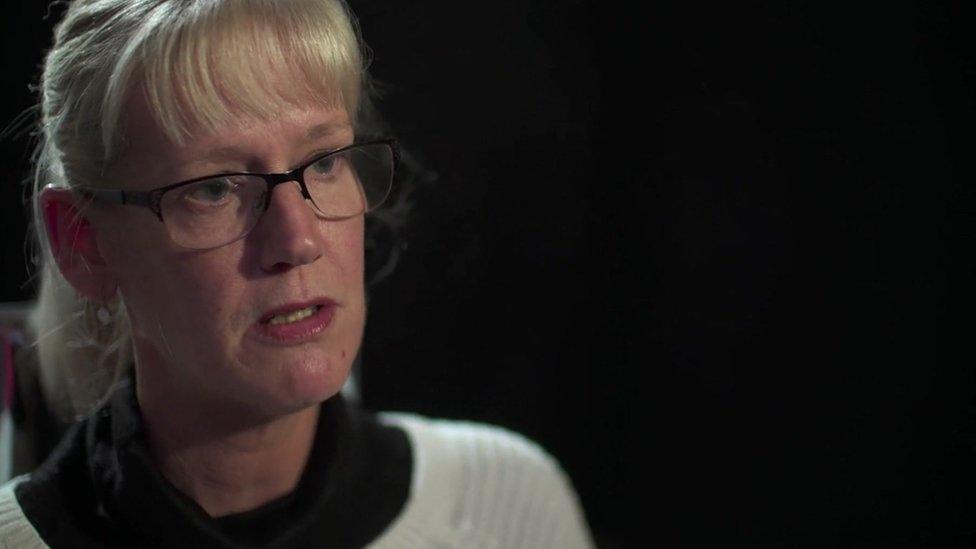
Robert's mum Michelle Fraser said drug dealers were "playing Russian Roulette with our lives"
Robert had died of a fentanyl overdose. He had been given the drug by a dealer when he had gone with friends to buy cannabis.
Michelle is convinced that Robert had no idea that he was taking fentanyl - or how dangerous it could be.
"Fentanyl is a killer and the drug dealers are playing Russian Roulette with our lives… my child died from it," she says.
Antidote
At the Eurofins Forensic Services laboratory in south-west London, they know all about the dangers of fentanyl.
And of carfetanil - a related drug developed as a large animal tranquiliser.
Just a few grains can be enough to kill. And it can be absorbed through the skin, or simply breathed in.
The laboratory's forensic scientists have to work in pairs with the antidote to fentanyl close at hand.
They test for the drug in specialised extractor cabinets which remove particles from the air and they wear disposable lab coats, double gloves and face masks.
The laboratory has, for decades, analysed drugs for the police and the CPS to provide evidence in court.
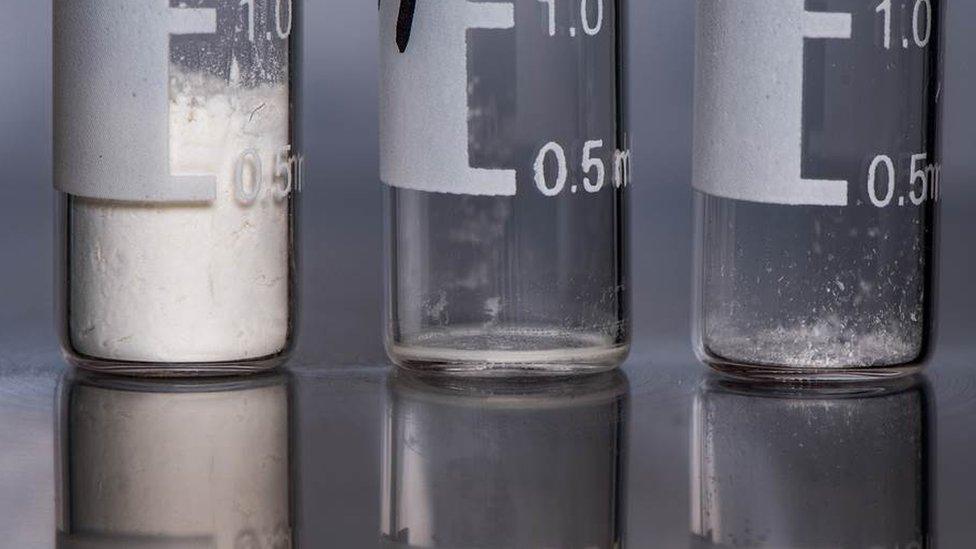
Lethal doses of heroin, fentanyl and carfentanil
Forensic scientist Peter Cain says: "Fentanyls are a different category of drug altogether.
"And the potential harm they could cause is just way above anything we have had in the past.
"It's the potency of them that is what's frightening."
Dark web
So where is this dangerous, deadly drug coming from?
Most of the supply in the UK is produced in China and then secretly shipped to the UK where users buy it through the dark web.
The BBC went undercover in China to get at least part of the answer.
After weeks of negotiations through messaging apps, we were invited to a meeting in an ordinary tearoom in a city in northern China.
Here we met a young manager from a laboratory which makes research chemicals. He's with his translator.
The conversation was stilted and slowed down by the language barrier but the message was very clear. They have brought samples of drugs made by the family firm.
No fentanyl, of course, as it is too dangerous for this public place.
The laws in China mean some labs can make certain types of fentanyl legally. The issue is who they are prepared to sell it to.
Within minutes we were offered a deal.
Quickly we learned that fentanyl was freely available, no questions asked, with an offer to ship it out to the UK: A class A drug readily available for the international criminal market.
It would be packed up and sent discretely by mail or courier.
The BBC left without making an order. No drugs were bought.
Small packages
The reason drug dealers are attracted to fentanyl over, say, heroin, is that it is so strong - a little goes a long way.
It is a cheap alternative which can be sent in small packages.
From China, and other places where fentanyl is produced, the dealers must, eventually, get the drug into the hands of those who choose to use it.
Often, the last link in the chain is the so-called dark web.
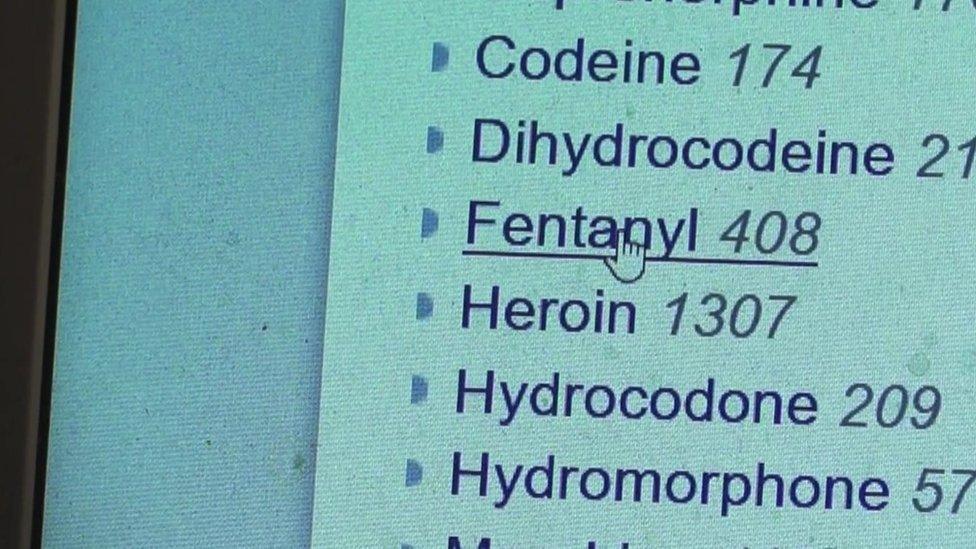
Most of the fentanyl supply in the UK is produced in China and then shipped to the UK where users buy it through the dark web
Author Jamie Bartlett researches and writes about this unregulated part of the internet.
He has logged on to a website that looks like any other online marketing site.
Except in this case, we are offered heroin, morphine and fentanyl.
Jamie says: "It turns everything into a very professional sort of transaction and it just feels like: 'I will go onto my computer, get a few drugs delivered to my house and don't even think too much of it.'
"I think people who spend a lot of time on these markets can lose touch with what they're actually doing.
"They don't realise quite how serious or strong some of these drugs are and the severity of the crimes they're committing, because it feels like you are on a normal website doing a normal bit of business."
Fentanyl has also been sold on the street.
'I was dead'
Across the north east of England, in the early part of 2017, heroin suppliers started secretly mixing fentanyl with their usual supplies in order to increase profits.
There was a surge in overdoses in the region.
In Teeside at least six people died. Kenny almost became the seventh.
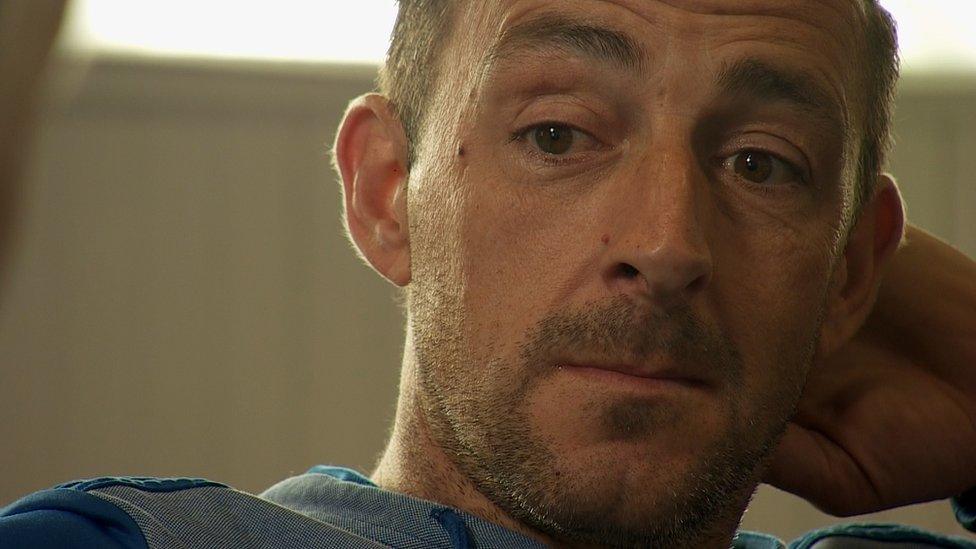
Kenny survived a fentanyl overdose because the antidote was at hand.
He has a long history of heroin abuse but his body was simply overwhelmed when he injected what the dealer had sold him.
"I was using what I thought was heroin and turns out it wasn't," he says.
"It was fentanyl or carfentanil.
"I overdosed - that is as much as I can remember. Injected it and overdosed. I was dead.
"I'd gotten about halfway down and I was just seeing red and that is the last I remember.
"It was like blood was covering my eyes."
Kenny survived only because he overdosed at a drop-in centre run by the Moses Project, which had taken the precaution of having the antidote to fentanyl.
The spike of deaths across the north east of England put fentanyl firmly on the radar of the National Crime Agency.
The drug has killed 113 people in the UK since 2016.
Laurence Gibbons, the NCA's head of drugs threat, says the agency has prioritised the threat from the drug and its analogues.
"We have a number of officers working solely on that threat and they will continue monitoring and we will keep a good watch on what is emerging," he says.
Twenty-five-year-old Kyle Enos, from Newport, south Wales, was jailed for eight years on Monday for exporting and selling fentanyl using the dark web.
This is believed to be only the second case of its kind in the UK.
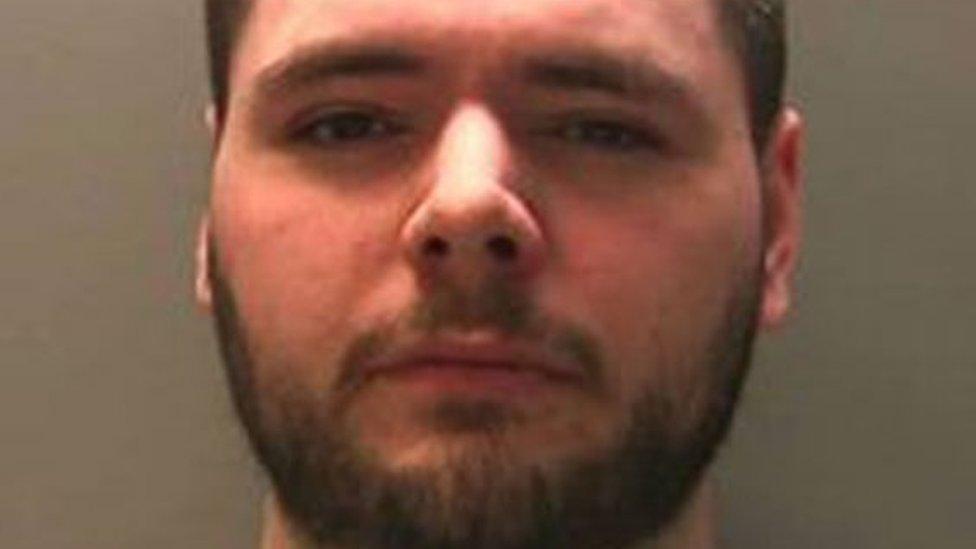
Kyle Enos was jailed for eight years on Monday for exporting and selling fentanyl
Meanwhile, Robert's mum is left with mementos, photos and videos that show a smiling young man with his whole life ahead of him.
Every day Michelle walks to the seafront in her hometown, Deal.
There's a bench there with a plaque in Robert's memory.
As she sits and looks out over the English Channel, Michelle takes time to reflect on the dangers of fentanyl, and how best to protect other young people, including her own younger son.
"People are sitting in their bedrooms and clicking a button and getting it," she says.
"The world I grew up in wasn't like that and don't want that future for my little lad, my surviving lad."

Where to get help
NHS Choices, external offers information on help for addicts and for their families
Talk to Frank, external provides information on the effect of drugs
Narcotics Anonymous, external offers help for recovering addicts and advocates complete abstinence